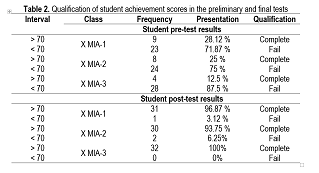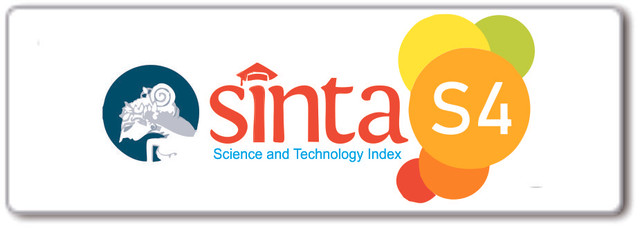The influence of student teams achievement division and numbered heads together learning models on students' cognitive learning outcomes and critical thinking abilities
Abstract
A conceptual analysis of the established functions and goals of education found that the low quality of education in Indonesia is still motivated by low student interest and learning. This problem must be addressed immediately by using learning strategies that can facilitate the development of student’s skills. Learning strategies using the STAD (Student Teams Achievement Division) and NHT (Numbered Heads Together) models are believed to be able to overcome this problem. The STAD and NHT models are cooperative learning models where both models condition students to study together in small groups and help each other. The type of research used is a quasi-experiment (Quasi experiment) which aims to determine the effect of the STAD and NHT learning models on cognitive learning outcomes and critical thinking abilities. Data were analyzed quantitatively using descriptive and inferential statistics in the form of ANCOVA analysis. The research results show that there is an influence of the STAD and NHT learning models in improving students' cognitive learning outcomes and critical thinking abilities
Downloads
References
Aeni, S. N. (2022). Analisis proses pembelajaran literasi digital dengan media whatsapp ditengah pandemi covid-19 pada mata pelajaran IPA kelas V di MI NU Sholahiyah Kudus (Doctoral Dissertation, IAIN KUDUS).
Ariyani, B., & Kristin, F. (2021). Model pembelajaran problem based learning untuk meningkatkan hasil belajar IPS siswa SD. Jurnal Imiah Pendidikan Dan Pembelajaran, 5(3), 353-361.
Assidiqi, A. J. (2023). Upaya guru menumbuhkan keterampilan berfikir kritis melalui literasi digital dalam pembelajaran IPS kelas VII SMPN 2 Ponorogo (Doctoral dissertation, IAIN PONOROGO).
Astrawan. (2013). Pengaruh model pembelajaran kooperatif tipe student team achievement division terhadap motivasi belajar dan hasil belajar IPA. e-Journal Program Pascasarjana Universitas Pendidikan Ganesha Jurusan Pendidikan Dasar, 3 Tahun 2013.
Faizah, R. A., Mubaidillah, M., & Putri, O. T. D. (2022). Meningkatkan hasil belajar siswa kelas V pada tema 7 peristiwa dalam kehidupan menggunakan model role playing di Sekolah Dasar Negeri 179. II Lembah Kuamang. el-Madib: Jurnal Pendidikan Dasar Islam, 2(1), 19-38.
Gustaviana, D.T. (2013). Pengaruh pembelajaran kooperatif tipe NHT terhadap hasil belajar siswa pada konsep energi dan perubahannya. Jurnal. Program Studi PGSD Kampus Cibiru Universitas Pendidikan Indonesia, 1(2), 1-8.
Hamia, H., Muis, A., & Nurhidayati, Y. (2023). Implementasi model pembelajaran problem based learning untuk meningkatkan hasil belajar dan keterampilan berpikir kritis pada materi perubahan lingkungan. Jurnal Pemikiran dan Pengembangan Pembelajaran, 5(2), 1102-1109.
Hidayati, A. N. (2021). Pengembangan LKPD berbasis model pembelajaran auditory, intellectually, repetition untuk meningkatkan kemampuan komunikasi matematika peserta didik kelas V Sekolah Dasar (Doctoral Dissertation, Universitas Lampung).
Nanditha, Y., Wirdati, W., & Kanus, O. (2023). Pengaruh model pembelajaran kooperatif tipe numbered head together (NHT) terhadap hasil belajar PAI. An-Nuha, 3(2), 228-239.
Nawangsasi, N. E. (2013). Pengaruh penerapan model pembelajaran studentteams achievement divisions dipadu numbered heads togetherterhadap motivasi dan hasil belajar siswa kelas X SMA laboratorium UM. Skripsi. Malang: FMIPA UM
Nuraini, I. (2023). Implementasi strategi cooperative learning tipe student team achievement division (STAD) dengan media audio visual pada mata pelajaran PAI Kelas VII di SMPN 2 Tamanan Bondowoso Tahun Pelajaran 2022/2023.
Putri, F. (2023). Analisis bibliometrik keterampilan berpikir kritis siswa dalam pembelajaran fisika (Doctoral Dissertation, Uin Raden Intan Lampung).
Putri, H. D. U., Fauziah, Y., & Febrita, E. (2017). Hubungan persepsi dengan hasil belajar siswa pada pembelajaran biologi menggunakan model kooperatif tipe numbered heads together (NHT) kelas XI IPA di SMA N 2 Tambang (Doctoral dissertation, Riau University).
Putri, M. (2021). Perbedaan hasil belajar siswa menggunakan metode talking stick dengan metode stad pada mata pelajaran IPS kelas VIII MTs. Al-Madaniyah Jempong Tahun Pelajaran 2020/2021 (Doctoral dissertation, UIN Mataram).
Rahmayani, D., & Subekti, H. (2022). Efek aplikasi quizizz terhadap motivasi dan hasil belajar kognitif siswa SMP pada materi sistem pernapasan manusia. PENSA: E-Jurnal Pendidikan Sains, 10(1), 117-121.
Safitri, A. O., Yunianti, V. D., & Rostika, D. (2022). Upaya peningkatan pendidikan berkualitas di Indonesia: Analisis pencapaian sustainable development goals (SDGs). Jurnal Basicedu, 6(4), 7096-7106.
Saputra, H. (2020). Kemampuan berfikir kritis matematis. Perpustakaan IAI Agus Salim, 2, 1-7.
Suparsawan, I. K. (2020). Kolaborasi pendekatan saintifik dengan model pembelajaran STAD geliatkan peserta didik. Tata Akbar.
Uno, H. B. (2023). Teori motivasi dan pengukurannya: Analisis di bidang pendidikan. Bumi Aksara.
Waris, W. & Priawasana, E. 2019. Critical thinking ability with improved problem based learning approach. Madrosatuna: Journal of Islamic Elementary School, 3(1), 49-58.
Wartoyo, F. X. (2022). Menakar korelatifitas merdeka belajar dengan Sistem Pendidikan Nasional Undang-Undang Nomor 20 Tahun 2003 dan Pancasila. Widya Pranata Hukum: Jurnal Kajian Dan Penelitian Hukum, 4(2), 140-153.
Wulandari, N. (2020). Studi komparasi model pembelajaran student teams achievement division (STAD) dan numbered heads together (NHT) terhadap hasil belajar siswa pada materi hidrolisis garam (Doctoral Dissertation, Universitas Islam Negeri Sultan Syarif Kasim Riau).
Yusup Ayi, A.M. (2021). Keefektifan cooperative learning STAD dan NHT ditinjau dari kemampuan komunikasi dan pemecahan masalah matematika. Research and Development Journal of Education, 7(1), 80-89.

Copyright (c) 2023 Serly Lessil, Dominggus Rumahlatu, Ritha L Karuwal

This work is licensed under a Creative Commons Attribution-NonCommercial-ShareAlike 4.0 International License.
Authors who publish with BIOEDUPAT: Pattimura Journal of Biology and Learning agree to the following terms:
- Authors retain copyright and grant the journal right of first publication with the work simultaneously licensed under a Creative Commons Attribution License (CC BY-NC-SA 4.0) that allows others to share the work with an acknowledgment of the work's authorship and initial publication in this journal.
- Authors are able to enter into separate, additional contractual arrangements for the non-exclusive distribution of the journal's published version of the work (e.g., post it to an institutional repository or publish it in a book), with an acknowledgment of its initial publication in this journal.
- Authors are permitted and encouraged to post their work online (e.g., in institutional repositories or on their website) prior to and during the submission process, as it can lead to productive exchanges, as well as earlier and greater citation of published work.








 This work is licensed under a
This work is licensed under a 